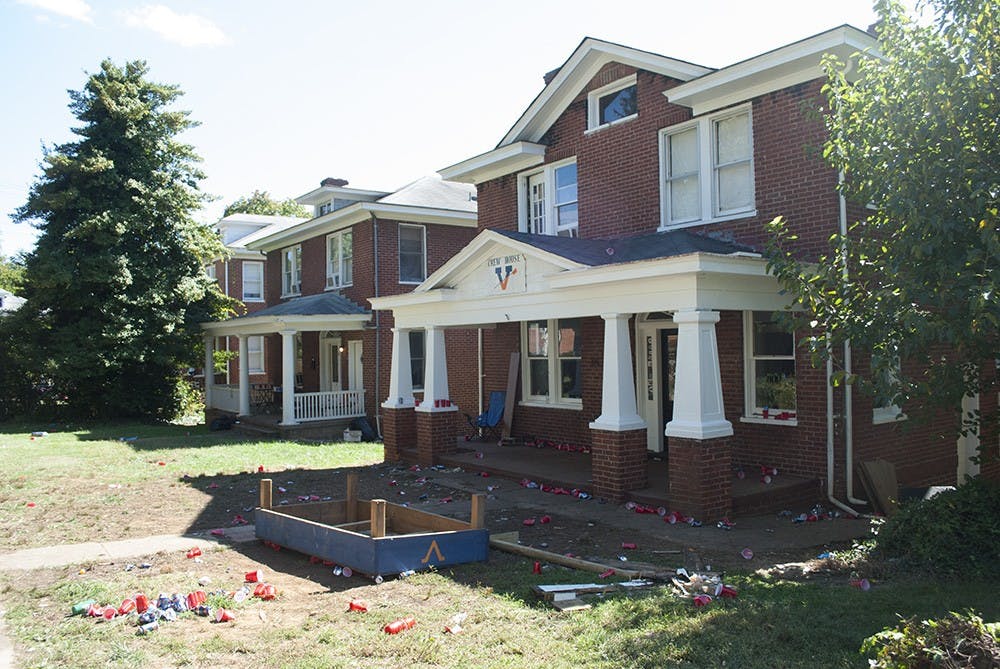In the flurry of lease-signing season, many University students seek out a modest apartment to share with friends. But many others pool together funds to live in house, handed down informally from members of their respective organizations around Grounds — be they Greek organizations, sports teams or any manner of student groups.
Current tenants typically have an agreement with the landlords to fill the houses for the next year themselves, keeping the the house in their organization's “family”.
“They don’t put the house on the market, … the landlord or the company relies on the tenants to fill the house for the next year,” said fourth-year College student Katie Thompson, who lives in a house handed down through members of the First Year Players, a student musical theater organization.
Thompson, the group's producer, said there are at least six houses currently associated with her organization.
“It’s a really tight-knit community, and we all live together,” she said. “Honestly, a large majority of FYPers live with all other FYPers. So it’s just part of our tradition to live together.”
Fourth-year College student Nazzareno Spurio, who lives in the Club Frisbee house, said this process makes the housing search much easier.
“The main benefit is security,” Spurio said. “[Having to decide on housing so early] makes finding a place to live difficult, so having a house that is passed down is great. Leasing afresh requires a lot more effort of scouting out potential places and roommates.”
If the house is not filled by members of the organization, it will simply change hands as the landlord seeks out new tenants.
“This is the second year we've had our house,” Spurio said. “Oddly enough, it was the old football house — so quite a change in ownership.”
Graduate Education student Matthew Schilling lived in the Crew house — meant only for members of the men’s club rowing team — for the majority of his time as a University undergraduate.
“I think it was a good move for me and older guys to move in [to the house],” Schilling said. “It wasn’t unusual for me to be hanging out one afternoon and having a teammate pop in and say 'Hi,' and I think that’s a cool advantage.”
He said independence, a close community, and similar schedules are just some of the benefits of living in a group house.
“A lot of people are up late cramming or something, while [the crew guys] go to bed at 10 or 11 to get up for practice at 5 or 6,” Schilling said. “It’s nice to live with guys with the same schedule.”
Schilling said the crew team has had its current house for about 30 years.
Third-year College student Frank Song said he has had a similar experience in the Academical Village People House, home to many members of the AVP a cappella group.
“[Something that] is very different about living at the AVP house is the open-door policy,” Song said. “People will just pop in to see if anyone is home or just to say 'Hi.' … I like living in such an alive environment.”
The house is also good for increasing the group's presence in the University community, Song added.
“It’s also good publicity,” he said. “People always pass by are like ‘oh, thats the AVP house.’”
These houses are also often recognized by students as the home for their respective organizations' parties and pre-games.
“It does get dirty very quickly because of all the people who come by for pre-games and parties and stuff,” Song said. “The AVP house has a reputation for being dirty, but we’re trying to change that.”
Third-year Commerce student Alex Spears, who lives in a house rented by members of the Hullabahoos, another a cappella group, said the experience is not as hectic as he expected when he moved from on-Grounds housing.
“I would say that it’s surprisingly less rowdy,” Spears said. “It’s definitely a lot more convenient for going out or going to get food.”
But sometimes, living in a public space comes with a downside.
“There’s just something about the [house],” Spears said. “People like to bust holes in our walls. I just want to make a PSA: to whoever is doing that, please stop.”
Rowdy party-goers aside, Spears said having a house offers lends his group an important sense of community.
“After finishing rehearsal at like 10:15 at night, we can just go chill in my room,” Spears said. “It’s nice if we just want to have conversations. ... It’s cool to get an inside view of the house. I don’t know if I would want to be president if I didn’t live there and see all the inner workings.”
Because the houses typically cannot house all members of an organization, groups typically have a system in place for deciding who can claim a room.
Schilling said that for the Crew house, upperclassmen typically choose rooms based on seniority.
“The big thing is bringing in guys who will stay on the team,” he said.
Spurio said Club Frisbee uses a similar seniority system.
“Getting a spot in the house was first come first serve,” he said. “From there, rooms were selected by seniority, which is run by the captains.”
Over the years, organization houses have become an important part of the University experience.
“Having all these different houses gives ... U.Va. a bit of flavor,” Song said. “You can walk down the street and it’s like ‘oh, that’s the AVP house; oh, that’s the Row House; oh, that’s the Ski House.’”







